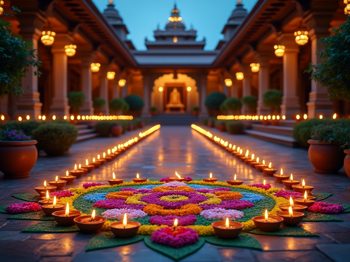



Thiruvathira is a traditional festival celebrated primarily in the southern Indian state of Kerala, particularly by the Hindu community. It falls on the Thiruvathira Nakshatram (star) day in the Malayalam month of Dhanu, which typically corresponds to December or January in the Gregorian calendar. This auspicious occasion is closely associated with the worship of Lord Shiva and is believed to commemorate the cosmic dance (Tandava) of Shiva and the day when Goddess Parvati united with him after her long penance. Thiruvathira is marked by a unique blend of religious rituals, dance, and fasting, and is especially significant for women, who observe it with great devotion for the well-being of their husbands and families.

Spiritual Union: Thiruvathira celebrates the divine union of Lord Shiva and Goddess Parvati, symbolizing the victory of marital bliss, love, and devotion. The puja is a way to invoke these divine blessings in one's life.
Protection and Prosperity: Performing Thiruvathira puja is believed to protect the family from negative influences and bring prosperity and happiness to the household.
Observance of Chastity and Devotion: The puja emphasizes the importance of chastity and devotion in married life, encouraging women to emulate the virtues of Goddess Parvati.
Cultural Heritage: Thiruvathira puja is a vital aspect of Kerala's cultural heritage, preserving ancient traditions and rituals that have been passed down through generations.
Marital Bliss: The observance of Thiruvathira is believed to strengthen the bond between husband and wife, fostering love, understanding, and harmony in married life.
Longevity of Husband: Women pray for the long life and well-being of their husbands, and it is believed that these prayers, along with fasting and rituals, can prolong the life of their spouse.
Overall Well-being: The rituals and fasting associated with Thiruvathira are said to purify the body and mind, contributing to the physical and mental well-being of those who observe them.
Spiritual Growth: The puja and associated meditative practices help in spiritual growth, bringing one closer to the divine and fostering a sense of inner peace and contentment.
Cultural Identity: Participating in Thiruvathira reinforces cultural identity and ensures the continuation of traditional practices that are integral to the community's heritage.
Thiruvathira is not just a religious observance but also a celebration of love, tradition, and the enduring power of devotion, making it a cherished festival in Kerala's cultural calendar.
Thiruvathira, a traditional festival observed in Kerala, celebrates the birth of Lord Shiva and is especially significant for women. The festival is typically marked by fasting, prayer, and the performance of a special dance called Thiruvathirakali. Below is a step-by-step procedure to perform Thiruvathira:
This is a basic outline of the Thiruvathira festival, and specific rituals may vary depending on regional practices and family traditions. The essence of the festival lies in devotion to Lord Shiva, communal harmony, and the preservation of cultural heritage.